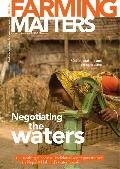We have now reached a point in which negotiations to find any common ground for our shared resource use have become so difficult that wars seem the only alternative. Yet, Anil Gupta feels that peace is possible – through shared use patterns, and the creation of frugal cultures that impose an artificial scarcity on those who are used to wasteful resource use.
Alongside the large-scale floods that fill the news these days, millions of hectares and people around the world are being affected by drought, with large areas suffering from severe drought and fires. The current tenor of these tragedies can be summed up as the result of water wasted during surplus months and used wastefully in scarce months.
Once the water problem was much less severe: population pressure was low and needs were limited – societies not only had reservoirs to conserve water sources. It is not for nothing that every mountain peak from which a stream flows is considered sacred almost all over the world. Buddhist teachers preached the need to conserve even a drop of water more than 2,000 years ago. Nobody could have imagined that, in many places, water would cost more than milk in 2010. Water is becoming an increasingly scarce resource. And yet so many people waste so much of it every day. How has this come to be?
Let us go into the past and try to understand why institutions for common property resource conservation emerged in the first place thousands of years ago. People seemed to have converted problems of risk into ones of uncertainty and tried to reduce their control, by creating randomness in the way resources were accessed. My feeling is that the elders realised that by creating an artificial scarcity of resources through institutions, they could justify allocative rules that were fair and just. Also, if communities were to be created, then water points could become meeting points where social and cultural exchanges took place and communities created. Shared futures were thus designed.
The introduction of markets made the individualisation of resources inevitable. Immediate consumption replaced deferred consumption. Satisfying all our needs at our own place rather than at our communal place became a lifestyle, a power and status symbol. Wasteful and redundant usage became the next logical step.
We have now reached a point in which negotiations to find any common ground for our shared resource use have become so difficult that wars seem the only alternative. Yet, I submit that peace is possible – through shared use patterns, and the creation of frugal cultures that impose an artificial scarcity on those who are used to wasteful resource use. We have to create new rituals, new institutions, new fashions and new trends. Water is too precious to be wasted on the altar of consumerist urges gone haywire.
Text: Professor Anil Gupta
Professor Anil Gupta teaches innovation management at the Indian Institute of Management in Ahmedabad. He is the founder of the Honey Bee Network (www.sristi.org), which collects and disseminates traditional knowledge and helps facilitate grassroots innovation. E-mail: anilgb@gmail.com

